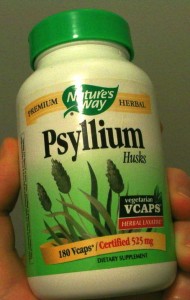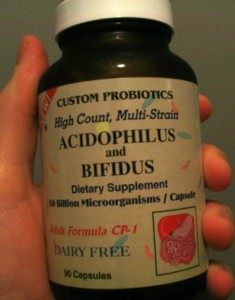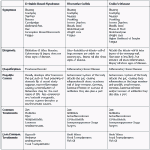Today we’re taking a look at Nature’s Way Psyllium Husks capsules.
 Psyllium husks come from the seeds of the psyllium plant. Psyllium husks are hydrophilic meaning they are attracted to water & readily absorb it. When saturated with water psyllium husks produce mucilage which is a thick gooey substance. Mucilage creates a film over mucous membranes, such as those found in the intestines. This film can help with the passage of stool as well as lowering inflammation by reducing the chances of irritation.
Psyllium husks come from the seeds of the psyllium plant. Psyllium husks are hydrophilic meaning they are attracted to water & readily absorb it. When saturated with water psyllium husks produce mucilage which is a thick gooey substance. Mucilage creates a film over mucous membranes, such as those found in the intestines. This film can help with the passage of stool as well as lowering inflammation by reducing the chances of irritation.
Psyllium husk is not digestible so it can be thought of as a “bulking agent”, meaning it will help add size to stool potentially increasing the chances of properly formed stool, which can aid with proper bowel movements.Psyllium husk is often advertised as a laxative, but it’s not a stimulant & can be used on a daily basis for those who want to try adding fiber to their their daily diet or treatment regimen. Fiber supplementation can be helpful for things like chronic diarrhea or constipation related to Irritable Bowel Syndrome or Inflammatory Bowel Diseases like Crohn’s Disease or Ulcerative Colitis. Continue reading “Review: Nature’s Way Psyllium Husks” »
Inflammatory Bowel Diseases can affect not just your family members, but also your family pet.
 Mississippi State University is reporting that, “TaTonka Gold”, their living dog mascot had to be euthanized due to a number of health problems, one of which was Inflammatory Bowel Disease. This reminded me of an article I saw a few weeks back: “Treating inflammatory bowel disease in dogs” from the Washington Post’s website. That article involved a pet owner writing in about their dog’s digestive problems, the answer they received back was too look into the possibility that their dog has IBD. Continue reading “Inflammatory Bowel Disease Can Affect Cats & Dogs” »
Mississippi State University is reporting that, “TaTonka Gold”, their living dog mascot had to be euthanized due to a number of health problems, one of which was Inflammatory Bowel Disease. This reminded me of an article I saw a few weeks back: “Treating inflammatory bowel disease in dogs” from the Washington Post’s website. That article involved a pet owner writing in about their dog’s digestive problems, the answer they received back was too look into the possibility that their dog has IBD. Continue reading “Inflammatory Bowel Disease Can Affect Cats & Dogs” »
Today we’re reviewing Custom Probiotics CP-1 Adult Formula, a multi-strain probiotic containing 50 billion colony forming units.
 When I first started looking into getting on a serious probiotic regimen I believed the holy grail of probiotics would be a low CFU(colony forming units) probiotic that you could slowly taper up as you got used to it. CFU is a measurement of the number of colony forming bacteria units inside a probiotic supplement. Supposedly the idea is that the more CFU the higher chances the bacteria will populate the digestive system.
When I first started looking into getting on a serious probiotic regimen I believed the holy grail of probiotics would be a low CFU(colony forming units) probiotic that you could slowly taper up as you got used to it. CFU is a measurement of the number of colony forming bacteria units inside a probiotic supplement. Supposedly the idea is that the more CFU the higher chances the bacteria will populate the digestive system.
My target at the time was around 1 billion CFU. This is why I reviewed a lot of products like Primadophilus for Children & Align. Part of the reason I was concerned with finding a low CFU probiotic was due to the fact that I often experienced herx reactions(flu like symptoms) & constipation when taking probiotics. My thought was that if I go low & slow, my body will adjust as I taper up. I’ve since learned that any probiotic I take gives me these reactions, so for me, low & slow has failed. I was often not taking probiotics because of the symptoms they produced.
Another thing to keep in mind is that the digestive system has literally zillions of bacteria within it. For someone with a serious bacterial imbalance, a 1 billion CFU probiotic product may cause a negative reaction like herx, but not offer any benefit as the bacteria die off before they can do anything worthwhile. Continue reading “Review: Custom Probiotics CP-1 50 Billion CFU Adult Formula” »
Inflammatory Bowel Disease is an autoimmune disease that causes chronic inflammation of the bowel. Usually Inflammatory Bowel Disease shows up as either Ulcerative Colitis or the potentially more serious Crohn’s Disease(neither is a cakewalk though). A new study by Northwestern University took a common probiotic(L. Acidophilus) & genetically modified it so that it lacked the gene “phosphoglycerol esterase” which normally causes inflammation in the gut. The probiotic was given to mice who had two different types of colitis. After a 13-day treatment the mice were almost completely free of inflammation and their disease was halted by up to 95%. The modified probiotic apparently works by acting as a calming agent on the autoimmune system so that it stops attacking the gut. Continue reading “Genetically Altered Probiotic May Help Inflammatory Bowel Disease” »
There seems to be some continual confusion about the differences between Irritable Bowel Syndrome & Inflammatory Bowel Diseases.
The main difference between the two is that Irritable Bowels Syndrome is a functional disorder, meaning there is little to no physical evidence of the disorder besides it’s symptoms. Inflammatory Bowel Diseases are not functional disorders and are diagnosable based off of physical evidence. Irritable Bowel Syndrome is usually much less severe than Inflammatory Bowel Diseases. Additionally “Inflammatory Bowel Disease” is not the actual name of a disease, but a classification for bowel diseases of an inflammatory nature. The two main Inflammatory Bowel Diseases are Ulcerative Colitis & Crohn’s Disease. They are not the same thing, though they have similar symptoms & treatments.
I made this handy chart below so people can get a better idea of the differences.

A recent study review found that 12 out of 16 probiotic studies saw better outcomes when using multiple probiotic strains instead of just a single strain. These studies covered many different topics such as inflammatory bowel disorder, Helicobacter pylori, gut function & others.
I don’t find this terribly surprising as our digestive tract is teaming with all sorts bacterial flora. There is no jack of all trades probiotic that does everything for the digestive tract. There are also many different sub-strains of probiotics out there. If you go to the store you’ll probably see a lot of bottles labeled as being L. Acidophilus, however each company breeds it’s own strain(unless the companies outsourced from same lab) of L. Acidophilus so you might even get slightly different results depending on which brand you choose. There also may be a host of probiotic sub-strains we haven’t discovered yet. This is why something like fecal transplantation is interesting because it takes a working bacterial ecosystem and transplants it into someone who does not have one. It’s hard to slowly rebuild a healthy bacterial ecosystem with only a handful of bacteria, especially when we do not know which bacteria are most effective for each person & we may even be missing some.
Bacterial Vaginosis & Yeast Infections affect millions of women each year. In many cases a quick trip to the store or to the doctors office for medication is enough to cure the problem. However, there are many women out there who will only be cured for a short period of time and then their symptoms return & become chronic. Before you know it repeated trips to the doctor or the store do not result in a permanent resolution to the problem & it can be extremely frustrating. I’ll highlight some tips and products that may help you get back on track to having a healthy vagina. Continue reading “Cures & Treaments For Chronic Bacterial Vaginosis, Yeast Infections or Vaginal Itching” »

Zoi Greek Style Yogurt Strawberry
The Rise of The Greek Yogurt Empire
Today we’re reviewing Zoi Greek Yogurt.
Zoi Yogurt is made by Auburn Dairy Products. It’s a regional brand found in the Pacific Northwest(USA). The packing is simplistic but charming. It advertises itself as having a “Great Taste – Fit For The Gods”. You can get Zoi in the following flavors: Plain, Vanilla, Honey, Strawberry & Blueberry. One of the best things about the fruit flavors is that they have “Fruit on the Bottom”, which I feel lends to the use of higher quality ingredients and allows one to mix the fruit in or slowly make their way to the fruity explosion awaiting at the bottom. I initially didn’t even know that there was fruit on the bottom(failed to read the label), there was the essence of fruit flavor throughout the yogurt even before I hit the bottom, so the fruit on the bottom was an extra bonus. Continue reading “Yogurt Review – Zoi Greek Style” »
Align Probiotic For Irritable Bowel Syndrome Update
This is a follow-up to my post “Align Probiotics Review: First Glance“. I did have some time to try out Align Probiotics and see how they worked out for me. Check out below for a week by week run-down.
Week #1
Week #1 started out pretty well. I did notice that I was dealing with some aches and fatigue, possibly due to Align clearing out toxins or possibly due to something else entirely(I am known to get sinus infections randomly). Within a few days these aches and pains stopped. I think I did start to see some benefit from Align almost immediately. Improvements such as not having to go to the bathroom as often, bowel movements feeling more complete & perhaps even less gas/cramping. Having the pills labeled by the day of the week was pretty handy to keep on top of taking it. I tried to take it the same time each day. Continue reading “Align Probiotic For Irritable Bowel Syndrome Update” »
 Align Probiotics Review
Align Probiotics Review
Buy Align from Amazon.com
Recently Proctor & Gamble’s marketing department got in touch with me to take a look at their flagship probiotic, Align. While I haven’t actually started taking Align yet, I’d like to share some of my first thoughts on the product.
I’ve seen Align advertised before & it has received good reviews on places like Amazon.com. I am a little skeptical on mass marketed products that have slick packaging. In some cases the word probiotic is used to attract people to a product that has little digestive benefit. In one case I got some terrible breakfast bars that supposedly had “probiotics” in them, but they were barely a step above sweetened laminated cardboard. I don’t think this is a goal of Align since they are strictly focusing on a probiotic supplement where the cardboard is only in the packaging, not the actual product. Continue reading “Align Probiotics Review: First Glance” »
 Psyllium husks come from the seeds of the psyllium plant. Psyllium husks are hydrophilic meaning they are attracted to water & readily absorb it. When saturated with water psyllium husks produce mucilage which is a thick gooey substance. Mucilage creates a film over mucous membranes, such as those found in the intestines. This film can help with the passage of stool as well as lowering inflammation by reducing the chances of irritation.
Psyllium husks come from the seeds of the psyllium plant. Psyllium husks are hydrophilic meaning they are attracted to water & readily absorb it. When saturated with water psyllium husks produce mucilage which is a thick gooey substance. Mucilage creates a film over mucous membranes, such as those found in the intestines. This film can help with the passage of stool as well as lowering inflammation by reducing the chances of irritation. When I first started looking into getting on a serious probiotic regimen I believed the holy grail of probiotics would be a low CFU(colony forming units) probiotic that you could slowly taper up as you got used to it. CFU is a measurement of the number of colony forming bacteria units inside a probiotic supplement. Supposedly the idea is that the more CFU the higher chances the bacteria will populate the digestive system.
When I first started looking into getting on a serious probiotic regimen I believed the holy grail of probiotics would be a low CFU(colony forming units) probiotic that you could slowly taper up as you got used to it. CFU is a measurement of the number of colony forming bacteria units inside a probiotic supplement. Supposedly the idea is that the more CFU the higher chances the bacteria will populate the digestive system.

 Align Probiotics Review
Align Probiotics Review